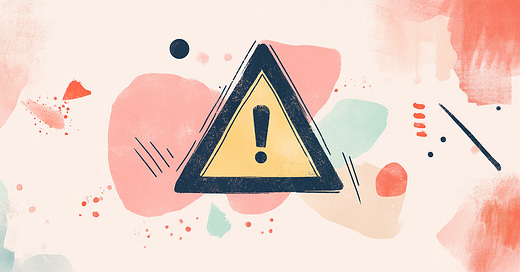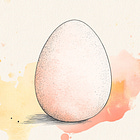5 Hidden Health Mistakes That Are Holding You Back—And How to Fix Them
These Overlooked Health Traps Could Be Holding You Back—here’s How To Avoid Them
As a certified medical doctor, and integrative and preventive health advocate, I’ve noticed patterns in how people approach their health—habits that often hold them back from feeling their best.
Here, I share with you 5 dangerous health mistakes that could be holding you back from feeling your best—and how to avoid them.
Break free from misinformation with science-backed insights, practical health tips, the latest research, and expert myth-busting—all from a certified Medical Doctor. Join 3,000+ like-minded people now!
(1) Losing Social Connections 🤝
Social relationships may influence mortality risk as much as smoking and even more than obesity or inactivity.
How to Avoid It
Prioritize meaningful relationships. Schedule regular calls or meetups with friends and family.
Engage in community activities or groups that align with your interests.
If you’re feeling disconnected, consider volunteering or joining a class to meet new people.
(2) Drinking Sugary Drinks 🥤
A study using Mendelian randomization, a technique that identifies causal relationships, confirmed sugary drinks increase the risk of colon cancer, a leading cancer for men and women.
How to Avoid It
Choose water first. If you’re craving flavor, infuse water with lemon, mint, or berries.
Opt for unsweetened alternatives. Herbal teas, black coffee, and sparkling water are great swaps for sugary drinks.
Read labels carefully. Even drinks marketed as “healthy” (like fruit juices or flavored yogurts) can contain hidden sugars. Look for “no added sugar” options.
Cut back gradually. If you’re used to sugary drinks daily, start by reducing the amount little by little to make the transition easier.
(3) Skipping Colorectal Cancer Screening 🔬
The US Preventive Services Task Force recommends colorectal cancer screening for all adults aged 50 to 75.
Remember this type of cancer is one of the most common cancers in both men and women
How to Avoid It
Talk to your doctor. If you're over 50 (or younger with a family history), ask about the best screening method for you.
Don’t ignore symptoms. If you experience persistent changes in bowel habits, unexplained weight loss, or blood in the stool, seek medical advice promptly.
Adopt preventive habits. A diet rich in fiber, regular exercise, and reducing processed foods and red meat can lower your risk.
(4) Not Getting Enough Sleep 😴
Lack of sleep affects our mood and is linked to a higher risk of obesity and mortality from cardiovascular diseases. Adults need 7+ hours of sleep nightly.
Here’s how the recommended daily hours of sleep vary depending on your age.
How to Avoid It
Prioritize sleep as a non-negotiable. Treat it as an essential part of your health routine, just like eating well and exercising.
Create a bedtime routine. Set a consistent sleep schedule, avoid screens before bed, and engage in relaxing activities like reading or meditation.
Optimize your sleep environment. Keep your bedroom cool, dark, and quiet. Invest in a comfortable mattress and pillow.
Limit stimulants. Avoid caffeine, alcohol, and heavy meals close to bedtime, as they can disrupt sleep.
Get natural light exposure. Sunlight during the day helps regulate your circadian rhythm, making it easier to fall asleep at night.
(5) Neglecting Gut Health 🍏
Another study using Mendelian randomization links gut dysbiosis to faster aging.
Changes in gut microbiota can influence how quickly the body ages
How to Avoid It
Eat more fiber-rich foods. Whole grains, fruits, vegetables, legumes, and nuts help nourish beneficial gut bacteria.
Include fermented foods. Yogurt, kefir, sauerkraut, kimchi, and kombucha provide natural probiotics that support gut health.
Reduce processed foods and sugar. Highly processed foods and excessive sugar can feed harmful bacteria and contribute to inflammation.
Manage stress. Chronic stress negatively affects gut health—try relaxation techniques like meditation, deep breathing, or gentle movement.
Stay hydrated. Drinking enough water supports digestion and keeps your gut functioning properly.
Be mindful with antibiotics. Use them only when necessary, as they can wipe out beneficial gut bacteria.
🎁 Get FREE months of premium access when your friends subscribe—just by sharing this newsletter!
Reader Favorites You Can’t Miss
Discover some of the most beloved articles to enhance your well-being:
To your health,
Sara Redondo, MD
P.S. You can read the studies by clicking on the links.
Disclaimer:
The information in this newsletter is for educational and informational purposes only. It is not intended as medical advice, nor should it be used as a substitute for professional healthcare guidance, diagnosis, or treatment.
Always seek the advice of your doctor or a qualified healthcare provider before making any changes to your health routine, starting new treatments, or addressing specific medical concerns.
This content does not create a doctor-patient relationship. While I make every effort to ensure accuracy, the information provided may not apply to your unique situation.










Help me out here. My wife is an ex-GI nurse and my SIL has also been told this by the insurance company. If a person goes into the procedure as preventative screening and then a polyp is found and treated with a snare or whatever, the procedure is no longer covered a preventative and additional cost is passed on to the patient. Ever hear of that? Personally, it wouldn’t change my mind for a screening colonoscopy, because the whole game is early detection (and treatment)
I was aghast when I found out a friend near 70 never had a colonoscopy but was scheduling one because he is on a transplant list. Even more shocking, his wife a nurse never had a mammogram.